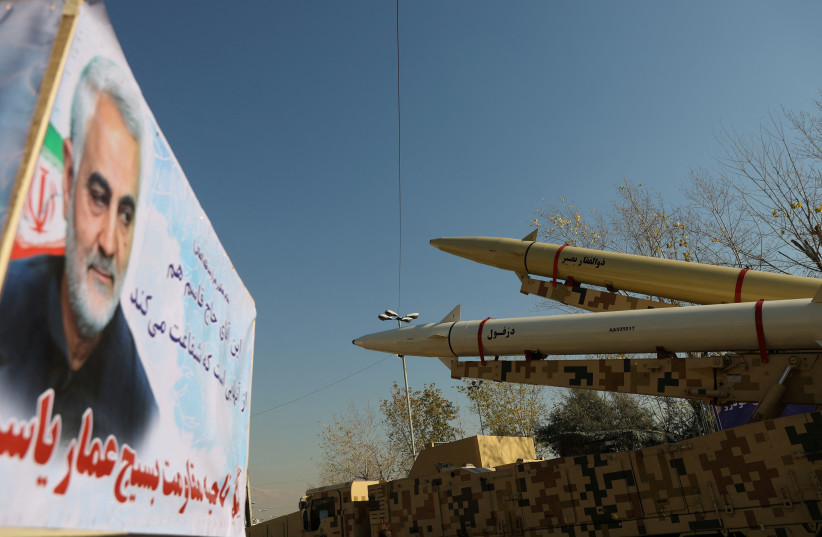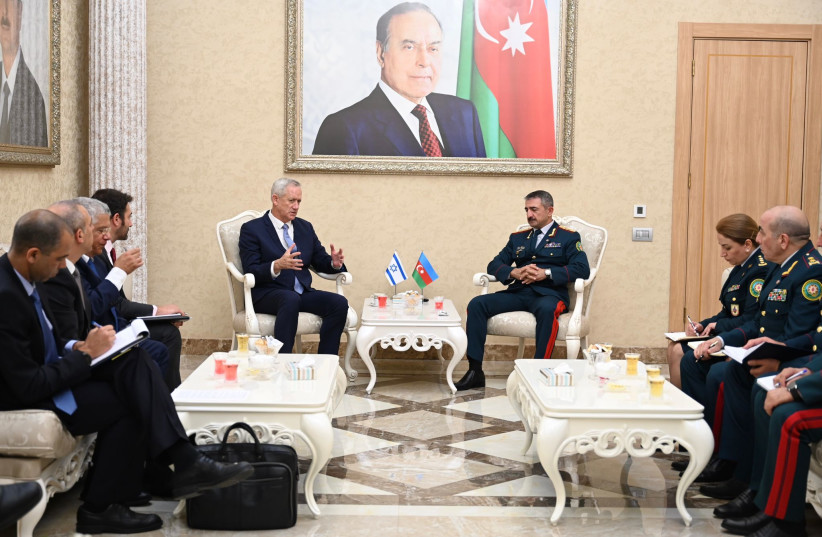Iran has spent the last two decades trying to bring its forces to Israel’s borders. This was manifested through support for Hamas, Hezbollah and the Hashd al-Shaabi group in Iraq. Now, Tehran is worried about Israel’s role in the Gulf as well as its warming relations with Azerbaijan.
Israel and Azerbaijan are strategic partners, with Defense Minister Benny Gantz recently visiting Baku. Israeli defense companies have also taken part in the Bahrain Air International Show and Israeli Air Force commander Gen. Eyal Grinboim visited Bahrain last week.
Iran is increasingly concerned about Israel’s connections to both Bahrain and Azerbaijan. This is important to Tehran because it reverses the usual role of Iran in the region, expanding its influence and attacking other countries via proxy groups. Now it is Iran who is facing protests at home and is worried that countries closer to it may be a threat.
With Hezbollah, the Iranian connection goes back decades, but it was in the wake of Israel’s withdrawal from Lebanon in 2000 that Iran and the terrorist group began planning to increase tensions with the Jewish state.
Hezbollah had a chance to lay down its arms and work within Lebanon’s system. Instead, it expanded its rocket and missile arsenal with Iranian support and began to threaten Israel, leading to the 2006 war.

After the war, it stockpiled another 100,000 missiles, moving them through Syria during the Syrian civil war.
Iran expanded its role in Syria during the civil war, focusing on specific areas after 2017. Iran’s goal was to be able to create another military front against Israel in Syria, using the Golan Heights border area.
Iran then moved ballistic missiles to Iraq in 2018 and 2019 and also moved drones to Iraq and Syria.
Israel, meanwhile, has carried out a war-between-the-war campaign, known in Hebrew as MABAM, to thwart the Islamic Republic’s threats in Syria. Iran hasn’t remained quiet in the Gulf either, transferring weapons to Yemen and threatening ships in the Gulf of Oman, seeking to expand its influence to the Red Sea.
Israel's presence in the Caucasus and in the Gulf
Nowadays, Iran is worried about Israel’s role in the Caucasus and the Gulf. A report in Iran’s Fars News on Sunday included a long critique of Azerbaijan’s recent posture, saying that Iran will not tolerate any Israeli presence there near the border.
“The Islamic Republic of Iran will not tolerate the presence and activities of the Zionist regime against its national security and will take any necessary measures in this regard.”

TEHRAN IS urging Baku not to enable any foreign countries to influence its policy. This is a response to Azerbaijan’s close ties with Turkey and Israel.
“Azerbaijan has been sponsoring pro-Israel movements and even the direct presence of Zionism in the region for years,” the report reads. “This country has forgotten that in the serious and historical crises of this region, it was Iran that supported the territorial integrity of this country and did not allow extra-regional powers to disrupt the strategic order of this region.”
Iran’s Tasnim news quoted opposition activists in Bahrain. The overall trend of these two articles is designed to warn both Bahrain and Azerbaijan.
Iran's response to the Israeli upgraded presence in Azerbaijan and Bahrain
It is likely not a coincidence that Iran has been talking up new weapons, such as “hypersonic” missiles, in an attempt to strike fear into the region. Tehran has said that its new missiles will soon be able to evade air defense systems, knowing that Israel possesses some of the most advanced ones in the region.
The Islamic Republic has tried to threaten Israel in the past with precision-guided munitions (PGMs). Therefore, the context here is that Iran is seeking to broadcast a message to Azerbaijan and Bahrain, whom it sees now as frontline states, bordering Iran at sea and land on two flanks. The message is that Iran can threaten the region.
For decades, Iran sought to move its proxies closer to Israel. Viewing the region like a chessboard, it is now lashing out in rhetoric because it believes Israel has been successful in its counter-moves.
From Tehran’s perspective, the high-level visits of Israeli officials to Bahrain and Azerbaijan represent a major regional shift. Iran knew that these two countries had warm ties with Israel, but recent months have brought more rhetoric from Iran against Baku, Manama and Riyadh.
